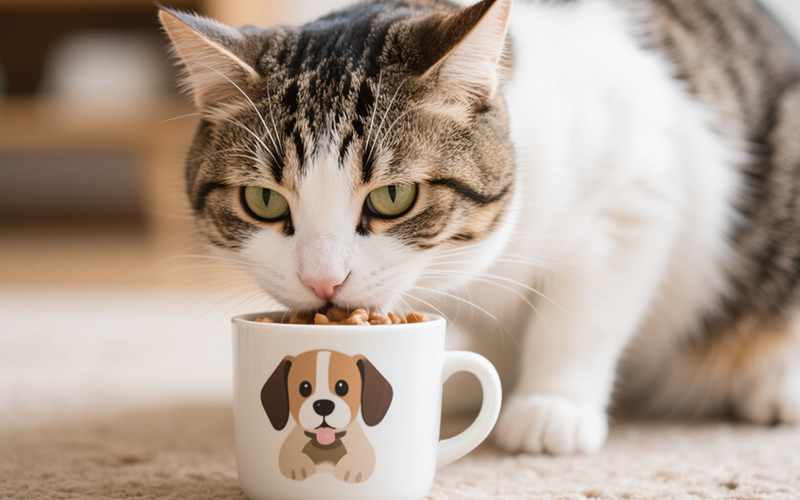Can Cats Eat Pup Cups? What You Need to Know About Treating Your Cat to a Pup Cup
- 8 Apr 2025 15:58
Pup cups are a popular treat for dogs, often made of vanilla ice cream or whipped cream and sometimes topped with a dog-friendly treat. But can cats eat pup cups? While these sweet treats are tailored for dogs, they may not be the best choice for your cat. Let's break down the potential risks and things to consider before offering a pup cup to your feline friend.

What is a Pup Cup?
A pup cup is typically a small serving of vanilla ice cream or whipped cream, often served by pet-friendly cafes or ice cream shops to dogs. Some pup cups may also include toppings like dog biscuits or other dog-safe ingredients. While this treat is designed specifically for dogs, many pet owners may wonder if it’s okay to share this treat with their cats.
Why Pup Cups Aren’t Ideal for Cats
Lactose Intolerance: Many cats are lactose intolerant, meaning they don’t have the enzymes needed to properly digest lactose, the sugar found in dairy products. Vanilla ice cream, whipped cream, and other common pup cup ingredients contain dairy, which can lead to upset stomach, vomiting, diarrhea, and gas in lactose-intolerant cats. Even if your cat isn’t sensitive to dairy, it’s best to be cautious.
High Sugar Content:Sugar isn’t ideal for cats, as it provides no nutritional value and can contribute to obesity, diabetes, and other health issues. The high sugar content in ice cream or whipped cream can spike your cat’s blood sugar levels and may lead to long-term health complications.
Artificial Sweeteners: Some commercial ice creams and whipped creams contain artificial sweeteners like xylitol, which are toxic to pets, including cats. Even if xylitol isn't present, the high sugar content itself can be problematic for your cat’s health.
Excessive Fat: Ice cream is also high in fat, which, when consumed in large quantities, can cause digestive upset or lead to pancreatitis in cats. Fatty foods are harder for cats to digest and can result in health problems, especially if they’re consumed in excess.
No Nutritional Value: Pup cups generally don’t offer any nutritional value for cats. Cats are obligate carnivores, meaning their diet needs to be centered around meat-based protein. Dairy-based or sugary treats, like pup cups, don’t provide the essential nutrients cats need.
What Can You Give Your Cat Instead?
If you want to treat your cat to something special, there are many healthier, more cat-friendly options that are safer for their digestive system:
Catnip or Cat Grass: Many cats enjoy nibbling on catnip or cat grass. These treats are completely safe and can offer a little indulgence without any of the risks associated with dairy or sugary foods.
Meat-Based Treats: Small pieces of cooked, plain chicken, turkey, or beef are a great option for a high-protein treat. Make sure there are no bones, seasoning, or harmful additives.
Commercial Cat Treats: There are plenty of cat treats available that are designed specifically for feline nutrition. These treats come in various flavors and types, offering safe indulgence for your cat without the health risks of dairy or sugar.
Frozen Broth: For a cool treat similar to ice cream, consider freezing low-sodium chicken or beef broth in ice cube trays. These frozen cubes can provide a refreshing treat without the harmful ingredients found in pup cups.
Frozen Meat or Fish: Some cats enjoy small pieces of frozen meat or fish, which can be a fun and cooling treat on a hot day. Just make sure to avoid any seasoning or additives.
What to Do if Your Cat Eats a Pup Cup
If your cat happens to eat a pup cup by accident, don’t panic. Here’s what to look out for:
Monitor for signs of digestive upset, like vomiting, diarrhea, or excessive gas. If any of these symptoms occur, it may be a sign that your cat’s digestive system didn’t handle the treat well.
Watch for lethargy or unusual behavior, which could indicate that the treat caused a more serious reaction.
If your cat shows signs of distress after eating a pup cup, it’s a good idea to contact a pet health professional or use PettureX for 24-hour online consultations to ensure your cat’s well-being.
Conclusion
So, can cats eat pup cups? While pup cups are not toxic to cats, they are not ideal due to their high dairy, sugar, and fat content. Cats may struggle to digest these ingredients, and they don’t provide any nutritional benefits. If you're looking to spoil your cat with a treat, stick to options that are designed for felines and offer more health benefits.
For any concerns about your cat’s diet or treats, remember that PettureX is always available to offer helpful advice and 24-hour consultations. 🐱🍦💚
Related

Frankly Dangerous: Can Cats Eat Hot Dogs? Vet Explains the Serious Risks
- 16 Apr 2025
A Purrfect Protein? Can Cats Eat Ground Turkey Safely? (Vet-Reviewed Guide)
- 16 Apr 2025
Gritty Situation: Can Cats Eat Grits Safely? Vet Explains the Risks
- 16 Apr 2025
Gravy Danger Zone: Can Cats Eat Gravy Safely? (Vet-Reviewed Warning)
- 16 Apr 2025
Crunchy Query: Can Cats Eat Green Peppers? A Vet-Reviewed Safety Analysis
- 16 Apr 2025
Toxic Temptation: Can Cats Eat Grapefruit? Vet Explains the Dangers
- 16 Apr 2025
Emergency Meal or Major Mistake? Can Cats Eat Dog Food For A Couple Days? (Vet Guide)
- 16 Apr 2025
Dandelions & Felines: Can Cats Eat These Common Weeds Safely? Vet Explains
- 16 Apr 2025
Flaky Danger: Can Cats Eat Croissants Safely? Vet Explains the Buttery Risks
- 16 Apr 2025
Hazard Alert: Can Cats Eat Corn Husks? Vet Explains Dangers of This Fibrous Material
- 16 Apr 2025
